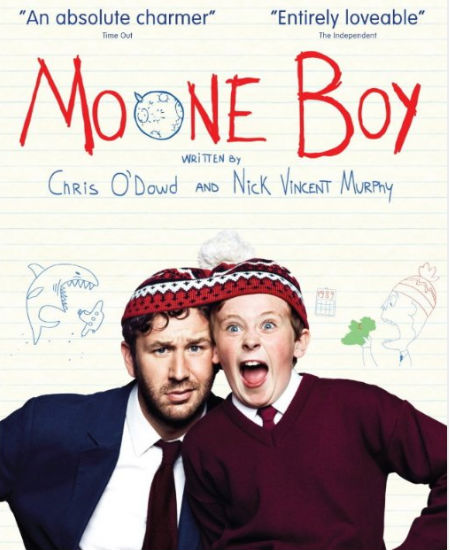
“Ever wanted to be the imaginary friend of an idiot boy in the west of Ireland? Me neither. But there you go.”
And with that pithy, funny, narrative-encapsulating line, Moone Boy, set in late 1980s Ireland and starring Chris O’Dowd (The IT Crowd, Girls, Family Tree) as said imaginary friend Seán Murphy (“the most common name in Ireland”) to endlessly optimistic, quirky as hell, lost in his own cartoon-populated world 12 year old Martin Moone (David Rawle) is off and on its charming way through the trials and tribulations of growing up.
What makes spending time with Martin so winningly enjoyable is that he remains happily unfazed by any and all of these trials and tribulations whether they involve arriving at school blissfully unaware he is sporting green eye shadow and ruddy-red blush courtesy of the sister with whom he shares a room Sinéad (Sarah White), losing his brand new bike to neighbourhood bullies Jonner and Conner (Brendan and Cillian Frayne) or having his sister Trisha (Aoife Duffin) taunt him with the idea that he is a “mistake” (to which Seán responds “Accident — accident, not mistake!”, though no one but Martin can hear or see him naturally).
Unprepared for many of the rites of passage common to a boy his age, thanks to loving but sometimes self-involved parents Liam and Debra (Peter McDonald and Deidre O’Kane) who married and had children young and still seem to be figuring out how to handle their new adult roles years later, Martin treats his first erection as some sort of physical defect – he and Seán decide it is a fungal infection caused by a chicken dinner left to defrost too long by his mother – the resulting nocturnal emissions as a matter of sheet-burying necessity, sweetly and cluelessly unaware that the two occurrences are most definitely related.
Sentimental to a fault, Martin, who wants to be bad and tough and treat his last day at primary school in the Lord of the Flies manner that his classmates do, instead succumbs to nostalgia and slight melancholy at “the end of an era”; as a result the scene where the young Moone recites a speech of thanks to his soot-stained, harassed teacher is a gem, the latter amazed that the former is so delightfully out of sync with other boys his age.
He is also possessed of a naively illogical ignorance of the effects of his actions.
Seeking a quicker way to school so he has time both to eat breakfast and scrub off Sinéad’s frequently-applied cosmetic efforts, he realises that if he simply dismantles the shoddily-constructed wall that stands between his backyard and his school, he can walk straight through giving him nine extra precious minutes to prepare for his often chaotic days.
While this works a treat for him, it also allows just about everyone else in the town of Boyle where he lives to get to the school faster too, resulting in his backyard becoming a busy pedestrian-thoroughfare, much to his parents’ displeasure.
But though he may not excel scholastically, he is in many ways an old soul in a pre-pubescent boy’s body, his insights often far more profound that those of his parents, and his observations more finely attuned (he picks for instance that his eldest sister Fidelma, played by Clare Monnelly is pregnant way before anyone else in the family does).
Through all of Martin’s oddly endearing excursions through the minefield of looming adolescence, his constant companion is Seán, who at the whim of Martin’s active and idiosyncratic imagination is as likely to be sporting bright pink ladies high heels shoes as he is much more preferred soccer boots, as he dispenses wisdom about life, the universe and everything.
He is course, the manifestation of Martin’s quirkily lateral mind, so his advice is only really as good as Martin’s limited understanding of the world at large but O’Dowd, who writes the series with Nick Vincent Murphy, invests him with endless patience, a line in self-depractory wit, and an endless supply of witticisms that leave you giggling with glee long ago Martin is off on yet another ill-thought but innocently-executed escapade.
He is also wonderfully fleshed-out, as is the secretive world of imaginary friends of which he is indelibly a part, so that when Martin temporarily pushes him away at the urging of his hipster musician uncle Danny (Steve Wall) and he is forced to hang out in the pub with other rejected and current imaginary friends, including the gorgeously-named Crunchie Haystacks, a wrestler who keeps Martin’s best friend Padraic (Ian O’Reilly) company, you feel sorry for him, aware that like the inhabitants of Pixar’s heartfelt Toy Story franchise, that his sense of self-worth and usefulness is wholly dependent on how long Martin chooses to keep him around.
Peppered with all manner of ’80s fashion items, toys, and political events – we witness the election of Mary Robinson as Ireland’s first female president and the tearing down of the Berlin Wall (and David Hasselhoff’s best forgotten concert on top of it) – Moone Boy is at heart a creatively-articulated, funny, frequently absurd and touching insight into the inner workings of a young boy doing his best to make sense of the world around him with little to no meaningful assistance and failing repeatedly to be as successful as he think he is going to be.
But so infectious is his positive outlook on life, and his unwillingness, with Seán’s protective help, to let the turkeys keep him down, that you always know he’s going to bounce right back, and it’s this never-say-die spirit, in the face of utterly uncontrollable, frequently nonsensical but all too real odds, that gives Moone Boy so much of its universally-relevant, charming appeal, and make you wish, just for a moment that you could have your own imaginary friend, especially one played by the talented Chris O’Dowd, always at your side.